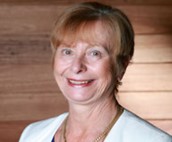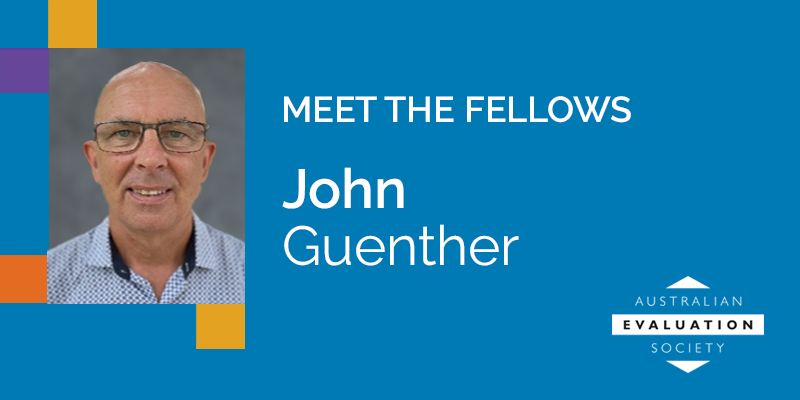Welcome to the AES Blog
In conversation with AES Fellow John Guenther
Members who have made a long-term and wide-ranging contribution to the AES and the field of evaluation are recognised through a special category of membership called 'Fellow of the AES'.
John was made a Fellow in 2023. He is Research Leader for Education and Training, based at the Batchelor Institute of Indigenous Tertiary Education based in Darwin, NT. Over the last 18 years John has conducted research and evaluation projects which have focused on remote contexts, covering all states and territories of Australia. He is the current Editor of the Evaluation Journal of Australasia.
Tell me what brought you into the field of evaluation?
|
I was invited to join an evaluation project back in the 90s. At the time I knew nothing about evaluation but was keen to know more! Then, increasingly, over the years, I got further involved and got to understand what evaluation was and how it applied to programs, events or initiatives. I have to admit that it took me out of my comfort zone, particularly as I had started in education, then I moved further into other areas, such as justice, domestic violence etc.. |
In terms of your evaluation expertise what do you regard as your main areas of interest?
|
My main area of interest lies in education as my professional background is in vocational training and adult education – although it has now extended into schooling and early childhood. Although I am now not just interested in the practical evaluative work but am extending my interest into the theoretical and philosophical side of evaluation. So, over the years my interest and direction has changed. I have also moved in and out of evaluation over the years. |
Looking back over your career, what have been the major challenges to your practice?
| I guess for me one of the main challenges has been to get the work of evaluators recognised in academic institutions, as evaluation is often seen as a second-class part of research. It is often not respected as having value in itself, but something you tack on at the end, so persuading people to see the value of evaluation has been a challenge. I remember a while ago writing a paper with a colleague and presenting it at a conference. Its title was: “Is evaluation a sibling of research or a bastard!”. We came to the conclusion then that it was being treated as a bastard. That was 12 years ago, and really I don’t think things have changed. |
What have been the highlights in your evaluation career?
|
For me the highlights have been my growing awareness about the important role that evaluation has in making change as well supporting good practice and informing policy. I feel that evaluation has the opportunity to contribute new knowledge, particularly in the fields of social endeavour and social change. I am re-framing evaluation to think about how it can contribute to the bigger social issues. As my particular area is focussed on Indigenous issues, I see some great opportunities for evaluation to contribute positively. |
Tell me about how you became involved in Indigenous issues
|
To be honest, at first I felt like an outsider who really did not have anything to contribute. But living and working in the Northern Territory you really cannot avoid it. You are right in the middle of the situation, particularly in terms of the number of challenges which First Nations people face, particularly in the remote communities. The problems faced by Indigenous people are right in your face and are impossible to ignore. The challenges are more often than not caused by poorly designed and implemented policies and programs. At first I was reluctant to be involved, then I found myself being invited into spaces and invited to contribute. I was building valuable relationships and continued to be invited into spaces where First Nations peoples operate. I have found that because I have been invited into First Nations spaces the benefits are being recognised by the Indigenous Elders as well as the community members. Evaluation can shine a light on the strength and resilience of people living and working in communities and support their aspirations for better programs and sustainable funding. Evaluation has been and continues to be, an important part of my work and of others at Batchelor Institute. |
What have been the major influence(s) which have helped to define your evaluation practice?
|
Along the way I have had some good mentors who influenced me in a number of ways. Those key people in your life who showed you how to do things, how to value, and as well how to bring in the money and do good stuff! Looking back to my PhD I had a really good supervisor whose judgement I valued and in my early career I had outstanding mentors who worked with me. If I look at the impact of my work and what in it has influenced others, I can see a set of values which encompass social justice, equity and treating people with dignity and respect as well as ensuring that those who are most marginalised are given voice. Those things influence the way that I work. I guess my passion is to see that my work is not just used for writing reports but is also transformative for those marginalised peoples. |
How has the field of evaluation changed during your career?
|
That’s a good question. I think the field is a lot more professionalised than it was when I started. I think there is now a much stronger awareness of ethical conduct in evaluations, particularly in relation to work with First Nations communities. |
What are the main skills or competencies that evaluators need to have or develop to keep pace with emerging trends in evaluation practice?
|
I think that one of the best skills to have are ears that hear what people have to say. Conversely, you also need to be aware of what is not being said. Coupled with that is the ability to read and understand what others have done, read the literature and engage in the academic thinking around the issue. Also, to engage with those people who are outstanding in their field and listen to colleagues and other evaluators. |
What do you see as the main social issues/problems that evaluators ought to be thinking about and seeking to resolve in the next decade?
|
There are so many social issues at the moment and in my space they are all interconnected. I am passionate about education, but also the connection between education, health and wellbeing, self-determination for Indigenous people, also with housing and the criminal justice system. These issues will define us. If we get them right, the future will be bright. I really feel that we can play a role in evaluating those issues and contributing to policies and programs. |
Now some questions about the AES
|
I joined the AES around 2006. I was at a conference and felt that it would be a good idea to join! Being a part of the Society has been great for the networking opportunities and just being part of a group or a tribe who thinks the same way. That is what motivated me to join the AES. I see an intrinsic value in being part of a professional group and the shared values which are generated as being part of a group. I think the camaraderie is fantastic and having that shared understanding which is gained from working together in this space. It is really good to belong to an organisation which will inform practice. I am also the Editor of the Evaluation Journal of Australasia, a position I have held for around two years now. |
How can the Society best position itself to still be relevant in the future?
|
For me a professional society like the AES has to be member focussed and its main purpose has to be to offer members what they need. It also should be an advocate for the profession and to ensure that those we engage with (e.g. government) really understand the profession, as well as the position of the society and its members. Clearly the AES should be aware of issues around the field of evaluation so that they can advocate on our behalf. At this stage I cannot see where the Society could contribute any further. I think the opportunities to do professional learning are really good. I also love the opportunities for networking. I belong to the local Darwin group and there are plenty of opportunities to contribute to the profession. I generally do a couple of seminars each year, so no need for any major changes to the AES. |
What advice would you give to an emerging evaluator?
|
The first piece of advice is to join the Society! The other thing is to read widely and get involved in understanding the theory and practice of evaluation. Understand that we do not want to see evaluation portrayed as a “second tier” and that it should be seen as something valuable and transformative – it has got to make a difference to the people in the programs which we evaluate. Get involved, get immersed in the space, connect and get a good mentor. On the subject of accreditation, I personally don’t see the need for it, but encourage an emerging evaluator to engage in their own professional learning. Every profession needs to grow and develop its own members. For a new person coming in, assume nothing and learn as much as possible. A lot of us drift in and out of evaluation, but the important thing is to develop evaluative thinking which includes the ability to make judgements, to assess things and weigh things up! |
------------------------
Anthea Rutter
Anthea is Research Fellow, Assessment and Evaluation Research Centre.


